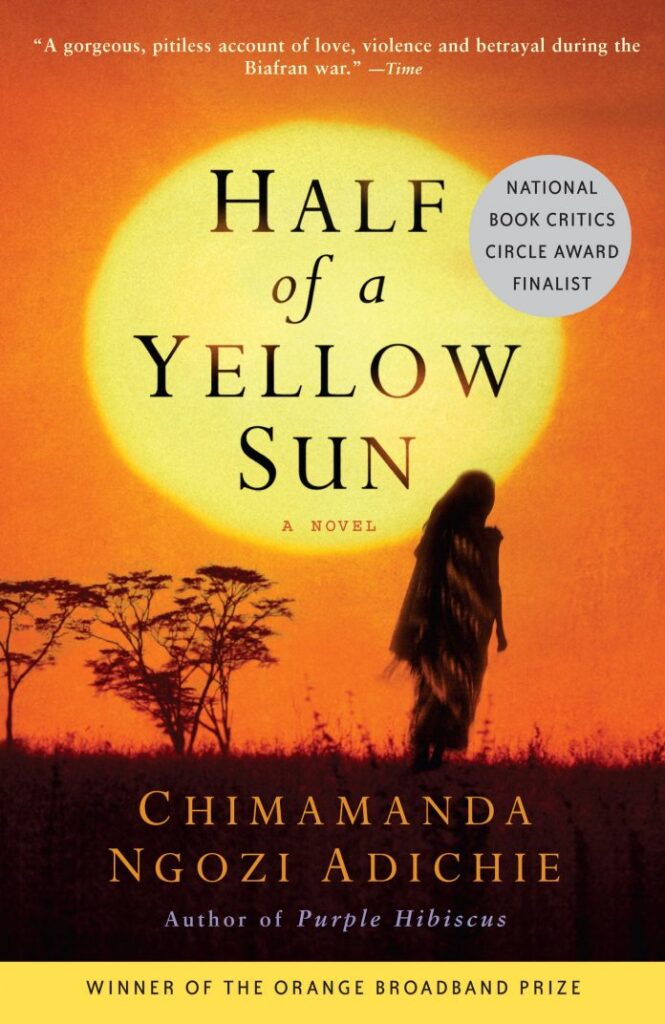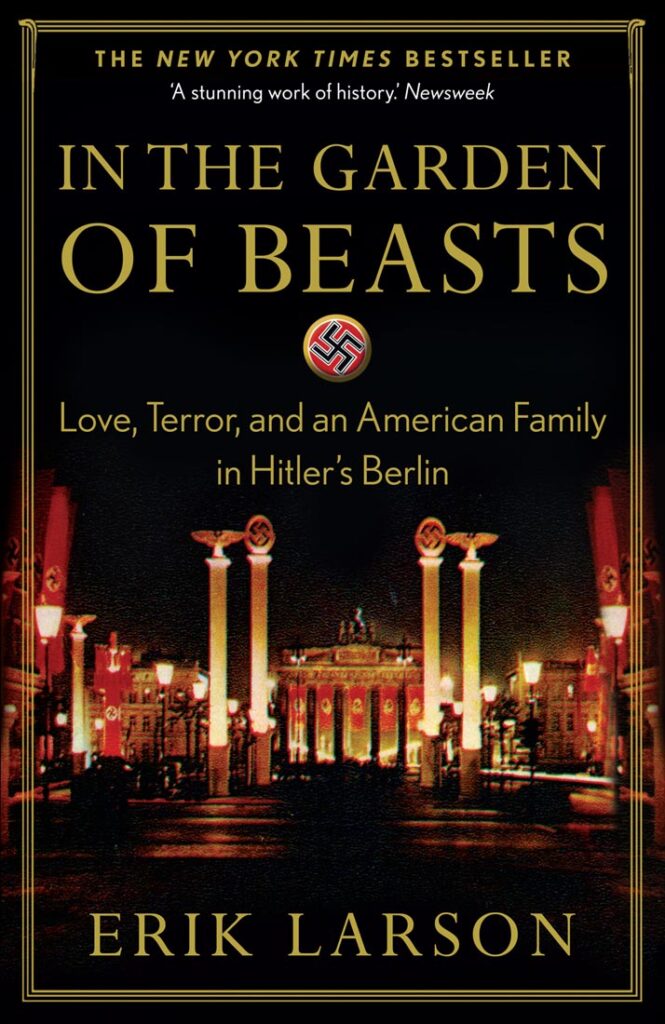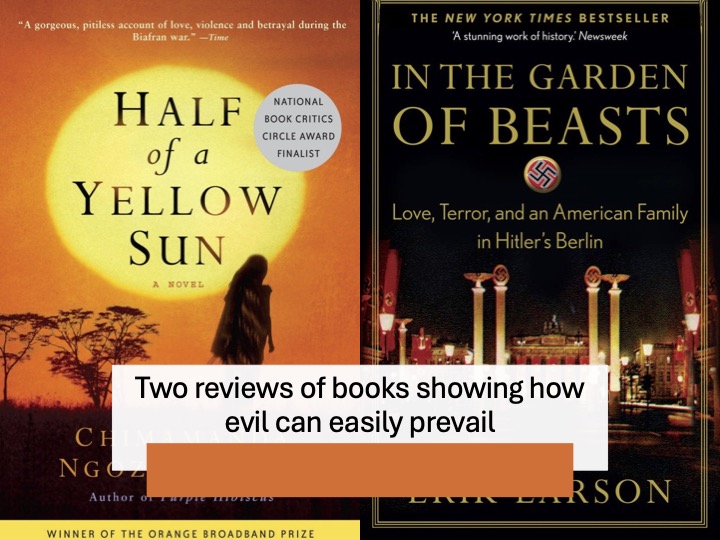The two reviews below may seem dissimilar. One is a novel set in Africa, the other a non-fiction work on pre-World War 2 Europe. But both books remind us of human depravity. We learn how easy it is for a group of people to be victimized by others. It starts as they are demonized through language and rhetoric. And, if not checked, ends with violence and destruction. Good people must speak up and defend those attacked when irresponsible people attempt to demonize one group of people for the purpose of gaining power. Even the Bible demands it, with laws which call for the protection of the vulnerable: aliens, widows, and orphans.
Chimamanda Ngozi Adichie, Half a Yellow Sun

(2006, audible 2017), 18 hours and 10 minutes.
This novel covers a lot of ground. It starts in the early 1960s, shortly after Nigeria received her independence from Britain and goes through the Biafra Civil War. It also the coming-of-age story of a young boy, Ugwu, along with two sisters of a Nigerian businessman (Olanna and Kaviene), a professor (Odenibgo), and a British expat author (Richard Churchill). Except for Ugwu, the professor’s houseboy, the rest of the major characters are educated individuals with status. All (except Richard) are from the Igbo tribe. However, their privileges end with when a pogrom against the Igbo people lead primarily by Muslims of Northern Nigeria. They all know victims of the violence, which led to the breakaway of the state of Biafra, which mostly consisted of Igbo people. A Civil War resulted from the breakaway, which ended in 1970.
The first part of the book focuses mostly on the setting. Ugwu, though his aunt, becomes a houseboy for Odenibgo. It’s a new experience for a boy from a village who has never seen running water or a refrigerator. However, the professor is kind, referring to Ugwu as “My Good Man.” He also insists Ugwu continue in school. Obenibgo home is often filled with other professors, who discuss the post-colonial politics of Nigeria. His home life changes when his lover, Olanna, another professor, moves in with them. Ugwu quickly becomes a part of the family.
Themes within the book
We also learn about Olanna’s sister, Kainene. Both live a different world, as they travel back and forth to Britain, where they were both educated. Kainene later becomes involved with Richard Churchill.
Much of the book is also about the relationship between sexes and marriage. There is much infidelity but also there are examples of great compassion such as Olanna adopting the child of a former lover of Obenibigo. Interestingly, some of the sex is set up by parents, such as when Obenibigo’s mother uses a village girl to entice her son away from Olanna, or where Olanna’s parents suggest a relationship for her to enhance a business deal. Other times such trysts are based on revenge.
Through the interaction of these characters, we learn of the failure of colonialism. Britain forced together different peoples and tribes to artificially create the nation of Nigeria. At least through the eyes of the Igbo, they felt the Britain favored the Muslims in the north, which set up the tension that led to war. The Igbo people are traditionally from the southern part of Nigeria. Because they are hardworking, jobs took them to other parts of the nation. This leads them to be demonized, especially by the northern Hausa peoples. The ethnic tension led to a massive killing that throws everyone’s lives into turmoil.
Half a Yellow Sun Meaning
It’s well into the book that the reader first encounters the term, “Half a Yellow Sun.” It’s the emblem on the Biafra flag, which shows the sun rising, reflecting hope in the future for an independent Biafra. Excitement and hope build among the Igbo people. Sadly, the optimism shatters as Nigeria reclaims parts of the new nation’s territory. Few nations support the breakaway state. Both Britain and the Soviet Union support Nigeria, while only France and a few African nations support Biafra. Those through whom the story is told sees Britain as only looking out for its oil investments in Nigeria, some of which was in the state of Biafra.
The character’s struggles
While most of the main characters in the book are from a privileged class, they, too, experience terror. They have family members brutally murdered in the pogrom. They also lose their privileged status when they are forced to flee the Nigerian troops. Even at the end of the book, things are left unsettled, as Kainene remains missing. This was true for many people in Brifai after the war.
Warning and recommendation
The reader should be warned of the squeamish nature of some of the stories. The killings during the pogrom as well as the horrors of war. Ugwo is conscripted into the Biafran army and excels in making explosions and setting mines for the Nigerian army. But he also experiences terror and extreme behaviors.
Half a Yellow Sun provides the readers insight into the difficulty of the transition from a colony to an independent state. It also shows both the pride and the trouble of Biafra, through the eyes of the Igbo people. While there are difficult parts to read, the book reminds us of the danger of demonizing others.
Personal connections
I have vague memory of the Biafran war. At the time (I would have been 10-13) our nation’s eyes were more turned to Vietnam. I appreciate this book and met the author in 2010 at Calvin’s Festival of Faith and Writing and purchased the book at that time. Somehow, I lost the book, so I listened to this on Audible. I have also read her novel, Purple Hibiscus.
Erik Larson, In the Garden of Beasts: Love, Terror, and an American Family in Hitler’s Berlin

(New York: Crown, 2011), 448 pages with a few photos, notes and an index.
Franklin Roosevelt had a difficult time finding an ambassador for Germany in 1933. Normally, such a post would have been a plum spot for a key supporter, but with Hitler’s rise to power, no one wanted to touch it. Roosevelt finally asked William Dodd, a history professor whose academic work focused on the American South. Dodd had spent time in Germany during graduate school before the First World War. In his early 60s, Dodd saw this as one last chance to have his family together. He and his wife, their adult daughter, and adult son, along with the family’s Chevrolet, moved to Germany.
Dodd as an ambassador
Dodd was an unusual ambassador. While he was paid $17,500 a year, which was a great salary during the Depression years, he was not independently wealthy. Upon agreeing to the position, he announced he would live within this salary, something that went against the protocol where ambassadors to favored countries were wealthy and lived far beyond their salary. He also showed more loyalty to Roosevelt than to the State Department which caused him problems. Roosevelt wanted him to do what he could to tap down the Nazi rhetoric against the Jews and to discourage the rising militarism in Germany. His superiors at the State Department were often aghast as his avoiding Nazi Party rallies (which he said would be as inappropriate as a foreign ambassador in the United States attending the Republican or Democratic Conventions.
Much of Dodd’s initial duties in Germany was to protest mistreatment to American citizens. This included many young men who were beaten for not giving the Hitler salute during a passing parade of Nazis. Eventually, the Nazis said foreigners did not have to salute. Still, still some overly enthusiastic Nazis beat foreigners who didn’t show the expected respect. He also had to protest attacks on American Jewish businessmen.
At first, Dodd hoped either the army or the people in Germany would revolt against the Nazi party. By the “Night of Long Knives” (when Nazi leadership took out the SA and top army officials) Dodd had realized the outlook looked bleak. Most of Larson’s review of Dodd’s work comes in the first 18 months of his four-year tenure.
Dodd’s daughter, Martha
In addition to informing the reader of Dodd’s duties as an ambassador, much of the story centered around his wild daughter, Martha. Before heading to German, she had an affair with the poet, Carl Sandburg, a family friend. In Germany, she also had an affair with the American author, “Thomas Wolfe.” Upon arriving, she was sought after and dated a Nazi leader. One German thought the Fuhrer could benefit from a relationship with her and set her up to meet Hitler. He kissed her on the hand!
At first, Martha admired the enthusiasm of the Nazis. However, she soon came to realize the hatred behind the facade and moved away from such entanglements. She also dated an attaché in the Soviet embassy. She even went on a trip, by herself, to the Soviet Union. After the war and her parent’s death, she was investigated for her involvement with the Soviets (who she saw as the world’s hope to defeat Germany). She fled American and lived the rest of her life in Prague.
Recommendation
Reading the book, it is hard to comprehend the Nazi hatred. They used hate to seek power, not letting anything stand in their way. They even changed the phonetic alphabet (how you spell out words so there would be no confusion). Prior to 1934, D was for David and S for Solomon. Afterwards, because David and Solomon were Hebrews, the phonetic alphabet was changed to Dora and Siegfried. The Nazi movement reminds us that language and rhetoric matters. Failure to speak out or challenge such can allow hatred to consume a people. This book needs to be read!
This is the fifth book I have read by Erik Larson and I have enjoyed them all. The first book I read, in 2005, was The Devil in the White City. I later read Dead Wake, Isaac’s Storm, and Thunderstunk.


Thanks for sharing both of these reviews. Both of these books are new to me and I enjoyed reading your thoughts.
I’ve only read the Larsen book, but the others sound like excellent books. I know they will be challenging, and I’ll have to read them during the day, not just as I’m ready to sleep. My nighttime reading has to be light and soothing.
Thanks for the detailed reviews. They help.
I would agree that the topic, especially the descriptions in “Yellow Sun” would be troubling at night.
Those sound like hard to read books. Not sure they are in my wheel house for reading at the moment.
Both do require one to ponder hard topics
I’ve only read two Larson books and really need to read more. I hope to get to this one someday.
Which two? So far, I haven’t been turned off by any of his books. I
The Devil in the White City and Isaac’s Storm. There are so many more to choose from, but I think I’d like to read Thunderstruck next.
I enjoyed Thunderstruck and it’s got me back interested in regaining my amateur radio license.
Of all of Larson’s books, I think this one was my least favorite to read. It still wasn’t a bad read by any measure but paled when compared to how magnificent his previous books were to read. I think his latest one about Churchill was a somewhere between this one and his previous works.
I would agree that it’s not as good as the other four of his I’ve read, but it’s still good. I still think “The Devil and the White City” is the best, but I thoroughly enjoyed all of his books I’ve read. Reading Thunderstuck encouraged me to, 50 years later) to return to amateur radio
I don’t think I need to read much about human depravity, beyond what I read daily on social media. Depressing would be an understatement, but you do remind me. Good people must speak up. I do that more than I ever did in my youth. If not me, who?
Social media does show a level of depravity. Maybe I should have just used the term “evil”, for that was certainly involved with both the Nazis and the tribal troubles in Nigeria.